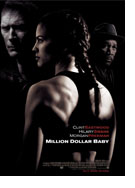

Opening 24 Mar 2005
Directed by:
Clint Eastwood
Writing credits:
Paul Haggis, F.X. Toole
Principal actors:
Clint Eastwood, Hilary Swank, Morgan Freeman, Jay Baruchel, Mike Colter
The job of the cut man is to stench the blood of boxers, so that they can continue fighting under the eye of the referee, who will disqualify in case of serious injuries. Frankie Dunn (Clint Eastwood) was a cut man for Scrap (Morgan Freeman) until Scrap lost an eye to the sport. Now Frankie runs The Hit Pit, a training club in Los Angeles and Scrap is his 24-hour janitor. Maggie Fitzgerald (Hilary Swank) trains at the club with initially no encouragement. Everything is against her: she is a girl; she is too old (30); she is uneducated and from the Missouri Ozarks; she works fulltime as a waitress. Naturally, once in the ring, she wins every fight until an injury stops her career. From this point we have a completely different film about a father-daughter relationship and guilt and morals. Maggie is immobile in a hospital bed wishing for death. Frank consults the priest about assisted suicide, saying, “By keeping her alive I’m killing her.” Scrap runs the club.
Eastwood, Freeman, and Swank are excellent as always. With over a hundred films between them, they have received every national and international award. In 1995 Eastwood attended the Filmfest Hamburg to receive the Douglas Sirk Prize for life achievement. He still amazes everyone as an actor (although here, his voice sounds forced) and director. Swank worked out in a Brooklyn Gym until she acquired a boxer’s physique. The film is no more violent than any other boxing report. If you hate boxing, you’ll find this violent; otherwise, the blood is necessary for the plot.
My complaint is that the story is not original. Based on Rope Burns by F.X. Toole (who was once a cut man), the first half is Girlfight and Billy Elliot about achieving a goal with the help of someone who cares. From there we go to The English Patient or Coming Home about being bedridden and physically handicapped, to end with Mar Adentro about the moral implications of assisted suicide. The title is misleading, since Maggie loses her million-dollar fight, although her hillbilly family thinks she has the cash; she is most certainly not a babe. Why did Frank’s own daughter leave him 23 years earlier, never to answer his letters? Why is he studying Gaelic and why the words Mo Cuishle? What’s with his motto ”Always Protect Yourself”? Why did this film get seven Oscar nominations? (Becky Tan)
How does a bond of love and friendship develop between two people, and how far is a person willing to go for the one he loves, are two of the central questions in Million Dollar Baby, actor/director Clint Eastwood’s follow-up to his highly acclaimed film Mystic River. Like River, Baby is also a story about redemption: here, those needing to be redeemed include Frankie Dunn (Eastwood), a boxing trainer nearing the end of his career, and Maggie Fitzgerald (Hilary Swank), a little-educated but determined 31-year-old who wants desperately to be a professional boxer. When Maggie shows up in Frankie’s gym, asking him to manage her, Frankie flatly refuses but is eventually nudged into the job by his right-hand man, former boxer Scrap (Morgan Freeman), who looks after the gym. After a lot of hard work, Maggie starts to fight and win, but soon things take an unexpected turn, resulting in some difficult decisions for both Maggie and Frankie.
Due to some controversial subject matter, Baby has polarized audiences in the U.S. However, I felt the decisions the characters make are entirely consistent with actions and motivations shown earlier in the film, and the phenomenal acting performances of Eastwood, Swank, and Freemen sell the plot twists. Several story points are left unresolved, which was a bit frustrating, but the questions raised make for interesting post-viewing discussions. Overall, Baby teaches some important lessons – money (even a million dollars) doesn’t buy happiness, always trying to protect yourself can’t guarantee you won’t get hurt, and family can be found in unexpected places – without being preachy, and the film is well-worth a viewing. (Kirsten Greco)